Sarah Clarkson's Blog, page 2
August 21, 2019
First, I Found Splendor...
(Reposted from August of 2014, just before my English sojourn began.)
For this, I see now (blessed) You gave me flesh,
The point of sense and muscle’s grip and skin
Was full immersion in this lavish earth
A world to drench the senses; rough and tender
Ardent lover, made to meet what reaches
Ever out in me; the whole a gift
To this five-sensed, sentient self: the means
By which I’m rooted in my place, but lifted
Too, in hunger, taught by every atom’s gesture…'
Nestled on a knoll of sun-drenched grass, most of the way up one of the Grasmere fells, I scrawled the first of the poem above. For I was in love. And by that I meant in love as a swimmer is in water, drenched in the ardent beauty imagined and formed by the first and primal love "that moved the sun and spheres." Tasting, touching, breathing a world so brimmed with golden air and undulating hills in carpets of shaggy, velvet green, and flowers in gemmed, wild profusion in old hedges, and ridges dotted with those clumsy innocents, the sheep, that every sense in me quickened, hungered, reached. And was sated by what it found.
I was in the Lake District for three days, a 30th birthday present to myself, a space of time in which I intended mostly to wander, to partake of beauty as if it were bread and I starving for it. A couple of days before I finally boarded the train to Windermere, I scrawled this in my journal: What do I really want while I'm there? I want my little girl heart again. I want that gentle, innocent self, the child, possible to me even now in adulthood if only I will make that inner room of quiet in which she breathes and sings. To work and bear and hurry are native troubles to adulthood in this world. But there is an essential rest that I think is reachable even amidst the whirlwind. A circle of hush in which that "still small voice" hums and speaks. That inner space, and the child who wonders within it, is what I hope to reclaim in my adventure.
And I did. But the wonder was that my guide and teacher was the gentle, gorgeous earth. I knew it afresh as the good gift it was in the beginning, the tale of God's kindness told in every atom of existence, there for our daily renewal. I found the simple wisdom of the earth, it's hush and humility, the way it retains and embodies the goodness to which it was called by its Maker, before the fall. But I found its profundity too; heard the low spoken prophecy that thrums in its beauty, it's vivid, dying beauty, as it waits for the healing that will one day come. I walked and walked, muscles glad in their straining, skin livened by wind and sun and sweat, my whole self restored, returned to its rest by the taste of hedgerow blackberries, the swish of grass, the mad baa of sheep, the windsong, cloudbreath, and green, green laughter of the meadows. To share a bit of the glory here with you is my thanks:
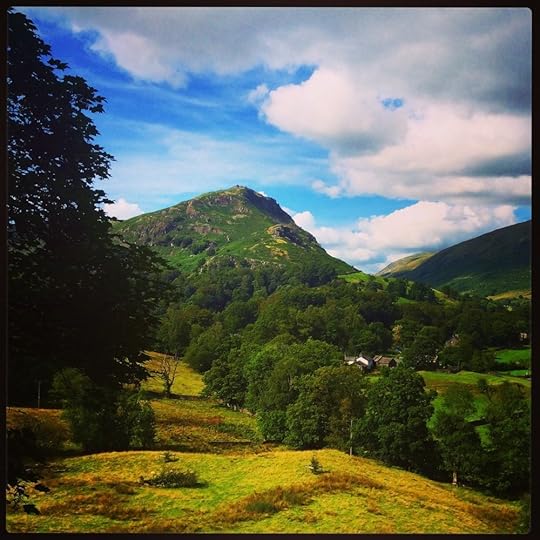
Taken from the spot where I perched to write my poem. You see, I wasn't exaggerating.

IMG_2163
Bank Ground Farm, my home for a couple of days, and also the farmhouse on which Arthur Ransome based his "Holly Howe" in the Swallows and Amazons books.

IMG_2125
Bank Ground Farm, the day I arrived.
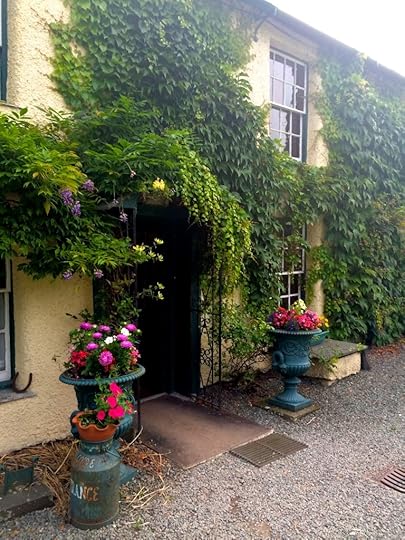
IMG_2157
Over and over, as I trod the long footpaths and bumped my way between towns on the rickety old buses in their dive down impossibly narrow roads, I struggled to describe the essence of the unspoilt landscape about me. And the word "benevolence" came again and again. This is a generous landscape. The sheer ebullience of vine and flower and color are a welcome in and of themselves, before you even step foot through the low, wooden doors of its houses.
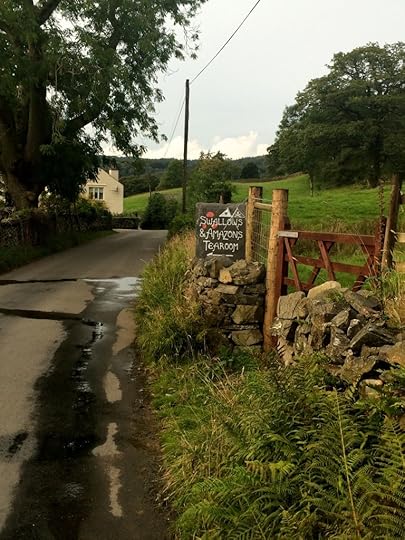
IMG_2155
What a pleasant sign, yes?
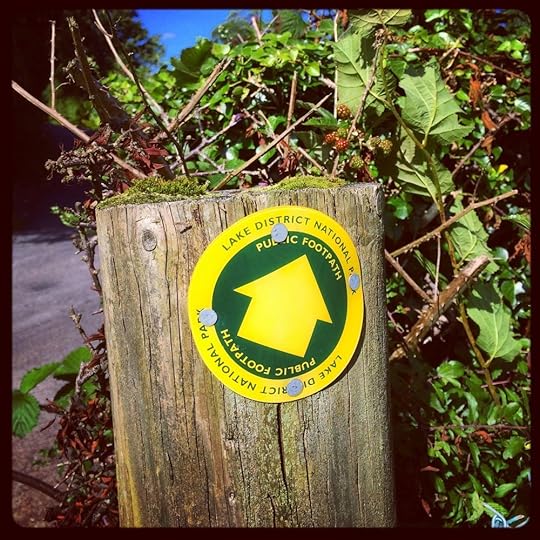
IMG_2241
One of my favorite things about England: public footpaths. Those little arrows gesture toward countless meadow tracks and forest ways. You might meet a few friendly (or taciturn) cows, scare a sheep, or find yourself in the far corner of an upland field, but the possibilities are endless. Just follow, not the yellow-brick-road, but the little yellow arrows, and you never know where the road might take you.

IMG_2222
One of the best salads I've ever eaten. Found after a long ramble. Please notice the sprig of lavender on top.

IMG_2238
Salad... followed, of course, by tea, and my ever-favorite walnut cake. Imbibed on a tiny table set on a terrace peering up the cloud-wreathed Coniston water on a blue and white and golden day.

IMG_2217
Brantwood, the home of John Ruskin. I too could write brilliant tomes on art if this were my home.

IMG_2072
The sheep here are such curious, but suspicious creature. I am helpless in laughter every time they scuttle away from me in terror after I've attempted to make friends. Their defiant "maaaaaa"s only worsen my affliction.

IMG_2095
Or it can begin with a ploughman's lunch. (Either way, good food is a vital ingredient to the success of epic, Lake District rambles). Another of my favorite English features. Pickled vegetables, chutney, cheeses, salad, and crusty bread... there are few better meals on earth, in my opinion, and few better repasts to set one up for an afternoon of exploration.

IMG_2092
My view as I ate my ploughman's feast.
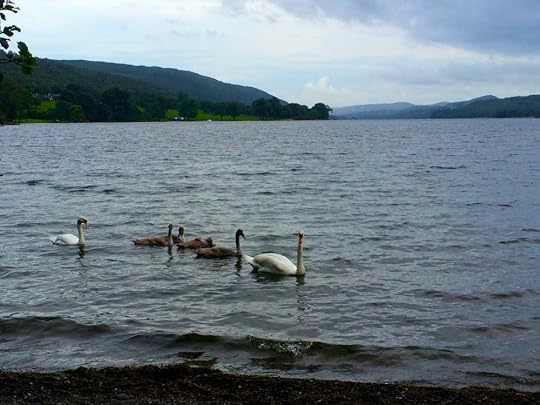
IMG_2236
On the last night, wanting a simple meal and a good long walk, I trekked the two miles into town and got fish 'n chips, the best kind, from a little chippy shop. They were hot and greasy, spattered with vinegar and salt, bundled in newspaper. And I walked halfway back, to a bench with a view right up the lake. And then, these elegant friends joined me and made my day complete.
But I have to end with this, with the words I jotted in my notebook at the end of my time:
"I have rambled and climbed and crept through giant ferns and scrambled over rocks and walked a streambed up a mountain and scolded sheep and sweated right through my shirt and met the brazen gaze of the sun with courage and I sit, now, by a river, little girl Indian-style with hair a-tangle and the glint of sun pennies flickering in my eye off the running stream.
I am the child I ever was. I've arrived back home in myself, at rest in the old, sweet ease that is the mark of a soul at rest. I do not strive. I do not fear. I do not fret. I said that what I wanted to find in coming to this place was little-girl Sarah, the old, enduring innocence that waits to return when I actually obey the Psalm and make myself still, let myself know again whose goodness underlies every bit of the beauty I love.
But this innocence is not a simple nostalgia. There is nothing backward about the return to simplicity. I haven't dwelt wistfully for a few days in ease, now to return, with a sigh, to a busy, adultish, but ultimately, more practical self. So often in our modern world, childhood and innocence are viewed as simplistic states, almost infantile, a backward state cured by savvy and cynicism and the street sense of the world. If my innocence is a return, it is regression only insofar as it is a retrenchment from an incorrect course. I walk back from the wrong road taken, I regress in the same way that my body returns from disease to a wholeness of health and self that is the only state in which any growth or forward motion can be attained.
Child-heartedness, innocence, simplicity, these are conditions of holiness, that fundamental health to which the soul must ever aspire. Innocence doesn't mean a separation from care and sin, it means a chosen state of faith. A willed decision toward purity of heart. A state in which wonder is the operative consciousness, in which hope is native to each decision, in which thanks, sometimes simply by way of revelry in what is to be found amidst the ordinary, is the ground of discovery, education, and creativity. It is, I think, a state of grace, that fundamental orientation of self required by belief in a Father God. For to him, we are all, eternally, children. The world is his ceaseless gift, and right action, even in the care and work of adulthood, is formed in the soil of thanks, begun by a seed of wonder.
And now, if only I can keep my grip on this knowledge when I'm wrestling my way through the crowds at Heathrow tomorrow afternoon..."
April 8, 2019
Isaiah Spring: A Poem (by me)
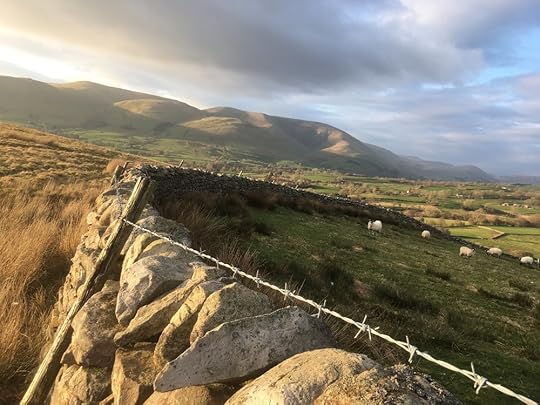
Years ago I spent a stormy, gorgeous spring in close study of Isaiah. My family was living near Nashville and I was in my late teens, wrestling hard with God and his mercy, with my doubt of his presence, my struggle with his justice and judgement. One of my great gifts and graces in that season, however, was the chance to drive up once a week or so to the home of a beloved mentor in a little Kentucky town where I stayed the night in her lovely home and attended this intensive Bible study the next day.
The drive to and from my friend’s home was a couple of hours and I spent it often mulling what I had just studied, the car filled with some sort of dramatic or classical music as I worked to untangle my idea of God’s love with his desire for holiness in his people and what that mean for modern me in all my teenage hunger for identity and meaning. The landscape out my window, the rolling hills and tangled forest of bare-branched trees made a fit setting to my tumultuous thoughts, as did the spring storms that often lumbered through the sky.
One week, I drove up for a longer stay as my friend and I had decided to have the leader of the Bible study over for an afternoon where we could ask all the hard questions we’d gathered after our weeks of reading, trace all the tiny roads of God’s love through the dark and bright beauty of wild Isaiah. I will never forget that afternoon as we three sat with cups of coffee set midst piled papers. open Bibles, notes jotted. I asked hard questions. I dared to speak my struggle. And we wrestled with the passages, with the tale of God’s goodness as it encountered human sin. And at the end of that afternoon, it wasn’t that I had no fear or questions left in me, but I had a surety of God’s love, of his dogged, suffering, ferocious love that shapes me to this day.
I took a long, long walk in the Kentucky countryside soon after and the words of the seraphim in Isaiah 6 were richly in my mind. Holy, holy, holy. Love and justice, judgement and pervasive mercy, what else can you sputter but glory? This poem grew from my wonder and worship, my thanks for the untameable, irrepressible lover of a Creator. It’s imperfect, but it was written in the gleam of newfound surety of God’s mercy invading the whole of my finite experience, and in this season of soul-wrestling, I wanted to share it with you (along with a few pictures from my recent sojourn in the Yorkshire Dales!).
Isaiah Spring
Branch etched air,
Bears blue,
Like smoke before an altar,
And the birds,
Awhir with laughter cry out,
Holy, holy, holy.
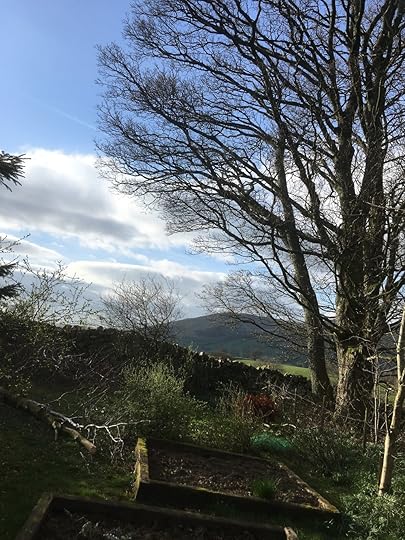
Snow carved boughs
Grow gold,
Like coins of countless treasure,
And the fields
New-filled with lilies claim as,
Lord, the God of Hosts.
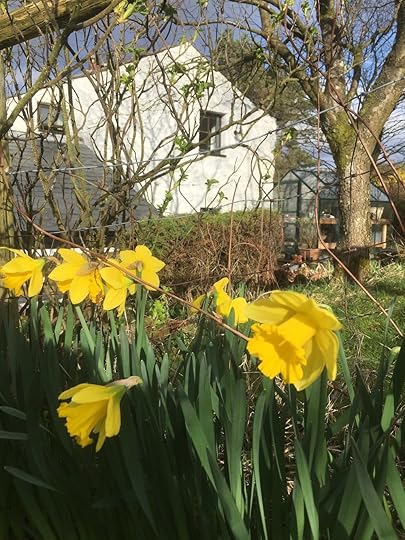
Wind hewn hills,
Spill green,
In torrents through the valley,
And the woods,
Aflood in leaf buds say,
The earth is full, full, full.
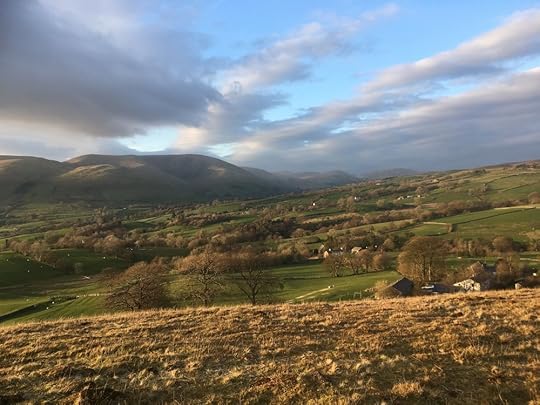
First spring dawn,
Runs red,
Like blood through brightened faces
Sears the sky,
With crimson traces
Of His glory, glory, glory.
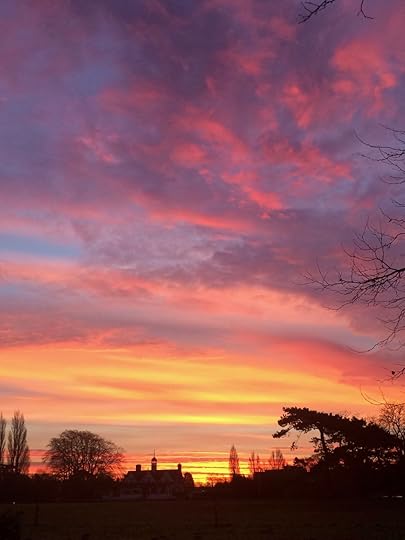
March 6, 2019
Lent in Love
A good Ash Wednesday day to you, friends. I wrote this piece originally several years ago, but I often repost it as Lent opens because it catches the heart of why I continue to keep and celebrate Lent. I couldn’t do it if it were only about proving something, even if that was my love. I keep Lent (however imperfectly) because I know it is one of the many ways I clear out the noise of my heart to hear, the busyness of my eyes to see, the Love that already holds me in a surety and fulness I rarely remember to acknowledge, to know. Lent is a way of remembering. To that end, may you too find, in these quieter days of the church year, simply… Love:
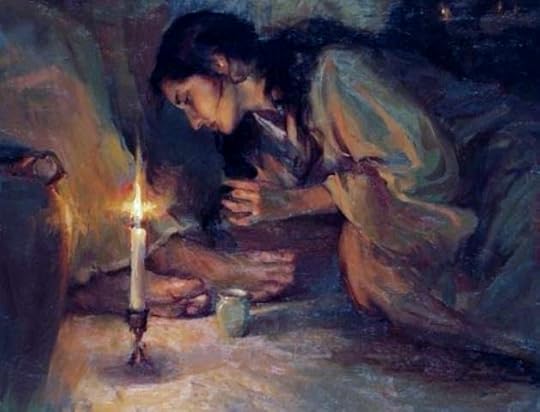
The Anointing at Bethany, by Daniel Gerharz
Lent is the season in which I rediscover love.
For most of my life, I understood Lent to be equated with law. With repentance, yes, and under grace, I know. After all, Lent ends with Easter and a feast to mark salvation. But since discovering this practice of the church a little later in life, I’ve mostly seen ‘the penitential season’ as a time in which I made laws of discipline to express my true contrition, to prove to God that my sorrow over all the ways I sin and fail is real.
Lent dawned bright this year in England, bright as my good intentions. On the day when much of the church begins a season of repentance, the sun blinked and gleamed in a stark blue sky and birds whistled as if it were May and the daffodils in the vase on my desk finally bloomed.
But that evening, after a long day, after a service in which the ashes of repentance were crossed into my forehead, I looked down the long trail of the coming days, and all I saw was grey. I was weary and afraid, doubtful that I could keep strict laws or great fasts. I felt too busy and tired to keep up the strictures of dawn devotion or the renunciation of chocolate. (You know?)
So my Lent began in doubt - of myself, and let us be honest, of God’s capacity to love an undisciplined me. I might have spent the whole of this quiet season in just such a mindset was it not for an encounter with a passage from Luke (during one of those attempted dawn devotions) and a woman of whom a self-righteous pharisee named Simon spoke exactly the words I felt were true of myself: ‘she is a sinner’.
The story in Luke is set in the pharisee’s home, at a dinner he held for Jesus, ostensibly in Christ’s honour, but presumably to prod and test him, find out if Jesus was, by pharisee standards, 'the real thing'. Simon comes to his own conclusions when a woman who had ‘lived a sinful life’ creeps in to express her love for Jesus. Bringing an alabaster jar of perfume and a heart so brimful of repentance that it spills into tears, she kneels at Jesus’ feet to weep and wash him with her tears.
Simon’s conclusion is instant. If Jesus really had God in or with him, he would know what kind of sinful woman was touching him. And, Simon must have assumed, send her packing. For Simon was one of the pharisees who counted out tithes even of their mint leaves, kept the minutest tenets of the Law, tithed and cleansed and followed the Law so well that even God, they thought, couldn't condemn them. But Simon was also of those, according to the passage just before, 'who rejected God's purpose for himself'. And what was that purpose? Love.
For the marvel of the story is that Jesus knew exactly what kind of woman was bathing his feet with her tears. He knew exactly the sin and grief that tortured her heart. He also knew the elaborate facade of good deeds and correct opinions by which Simon, the supposedly spiritual leader, kept guilt at bay. So Jesus told a story of two debtors, one who owed much and one who owed little. Both are forgiven by a generous moneylender and at the conclusion, Jesus simply asks of Simon which of them will love him more?
'The one who was forgiven most', says Simon, of course.
'Like this woman at my feet'', says Jesus, 'who has loved and wept and washed me with her tears, while you have not even given me the kiss of hospitality or a towel to wipe my weary feet. She has been forgiven much, and so she loves much. But he who has forgiven little, loves little.'
In a brief stab of insight I saw myself both in Simon and the woman. In Simon, because with him, I thought that God’s acceptance of me dwelt in my being correct and keeping my countless little laws of performance. I thought Lent was about proving myself so good that judgment couldn’t touch me. In the woman, because deep down I knew myself frail and weak, unable to assure my own salvation or even abstention from chocolate for forty days. Both were equally sinful, but one hid it even from himself, and so did not recognise Love at his table, while the other in her repentance saw him clearly and wept with gratitude.
In that moment, my understanding of what it means to keep Lent changed. Lent often has the reputation of being something that the super godly do, a sort of iron man competition, open only to the spiritually elite. I think we often look at the spiritual life in general this way. I look at the people near me in study and church and think that everyone must be doing it better than me as I scurry through papers and strive to make time for those I love and try to catch sleep and make it to my kitchen at night too tired to cook, let alone pray. The irony is that Lent (not to mention the Gospel) is precisely for the lost and discouraged, the brokenhearted and disappointed who know they have nothing left to give. Lent is for the hurried and distracted, the lonely.
The disciplines of Lent - prayer, devotion, fasting, stillness - aren’t meant as a heightened performance, an extra extravagance of discipline to prove we’re really Christians. Rather, they are meant to create a quiet space in which we listen afresh for love, ‘accept God’s will’ as we come and remember that we are forgiven. Discipline is a good thing - quiet is a gift. But only if rooted in Love and used as a means to push back the cacophony of life long enough for us to look heartward, knowing ourselves afresh as the ‘sinful women’ and ‘wretched men’ in whom God’s plan to save the world by grace is worked.
But we find that grace only when we face what needs forgiving. As long as we, with Simon and the pharisees, believe we need not repent, need not admit our insufficiency, we will simply stand rotting and wounded in the armour of our good deeds and defiant self-confidence, dying, if we only knew it, of the festered guilt we will not face. In facing that messy guilt, in coming to the broken place in which there is no longer any scaffolding of piety to uphold us, any pretense of righteousness to disguise us, we discover, first, our eternal inadequacy. And second, grace. Real grace. Not the cheap kind that slaps a mask over a distorted face, but the deep kind, the backward working magic of Christ in which we are met in our most broken places by Love.
I changed my Lenten rhythms after reading that marvellous story. I haven't quite managed the giving up of chocolate or the eager rising at dawn each day that I had planned. But I have stepped away from certain distractions (don't get me started on the number of screens that jostle for my attention), and taken the extra quiet to listen, to pray. I've risen early once a week to write, just to get my soul in the habit of articulation, and in the posture, once again, of listening. I've read a couple of novels whose words drip with grace. And in the hushed moments of these sweet times, I remember that I am forgiven.
And ah, how much I'm learning to love.
(And P.S., you can join me HERE for the first of the live Lenten Poetry readings I’ll be doing throughout this season if you’re so inclined.)

Mary Magdalene, Andrea Solario
February 28, 2019
Lenten Companions: Books, Music, Art, and Film for the Solemn Season
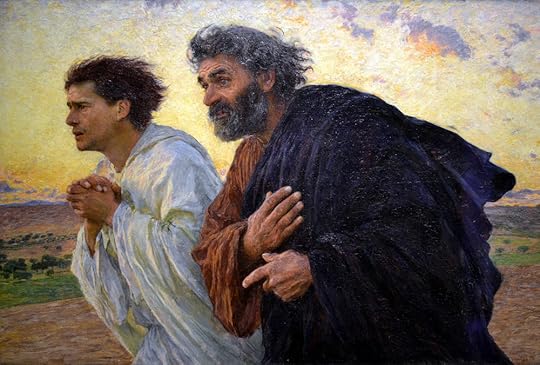
Eugene Bernand
“I imagine the dead waking, dazed, into a shadowless light in which they know themselves altogether for the first time. It is a light that is merciless until they can accept its mercy; by it they are at once condemned and redeemed. It is Hell until it is Heaven. Seeing themselves in that light, if they are willing, they see how far they have failed the only justice of loving one another; it punishes them by their own judgment. And yet, in suffering that light's awful clarity, in seeing themselves in it, they see its forgiveness and its beauty, and are consoled. In it they are loved completely, even as they have been, and so are changed into what they could not have been but what, if they could have imagined it, they would have wished to be.”
― Wendell Berry, A World Lost
Lent, I think, allows us a glimpse of what it means to live in Berry’s shadowless light. I chose the painting above for this post, one depicting Peter and John on the way to the empty tomb on Resurrection morning because I wonder if their awe and fear, their self-doubt, their examination of soul and sudden confrontation by the radiant reality of Christ reflects our own Lenten journeys. I know it’s Easter morning in that image, but the whole of what Lent means is at their backs. To come up against your own mortality, your own frailty and falsity as it is revealed by the clean, sharp, loving light of God’s holiness, to be both laid bare and profoundly healed by that encounter, this is what Lent means.
The keeping of Lent is something I have come to as an adult though, something quite foreign to me that required a concentration and commitment I have often found difficult. Not only do I really dislike fasting, I have struggled each year to know what to choose to give up, and even why. Am I trying to prove something about my value to God? Or myself? I have come to understand that Lent is an invitation to walk in the cleansing light of love, to look at my life and see what I depend upon for comfort or sanity or hope more than Jesus, in his given presence, his unceasing love. But I have been greatly helped in the giving up of my little, niggling comforts or large distractions by the companionship of story, art, and music that took me by the hands and helped me toward prayer, contemplation, endurance, and a heart ready to listen for the still small voice of God breathing through the cleared room of my heart.
I don’t mean to clutter your heart and mind with more things to see or watch or buy, to paradoxically do the opposite of what Lent invites us to experience, hush, fasting, prayer; that’s not the intent of this post, and I’m sorry if it adds to the general craziness! What I hope though, is if you, like me, need companions to lead you toward prayer, to help you be still, that the words and images here will help you to that hard, demanding, gracious work.Sometimes, standing in the imaginative space provided by a novel, a poem, a piece of choral music, a film allows us an encounter with shadowless light in its mercy and its beauty. The resources below have been companions to me in the past few Lents, companions on the solemn, soul-searching journey, helping me to know myself better, to empty my hands of the busy things that keep me from grasping Christ himself. I hope they’ll nourish you and companion you in the Lenten journey as well.
BOOKS.First, of course. (This is obvious, right?) To start, specifically Lenten titles. If you are looking for a good collection of Lenten essays, you’ll find nothing better than Bread and Wine: Readings for Lent and Easter by the lovely Plough Publishing. Malcolm Guite’s collection of poetry, Word in the Wilderness, with accompanying meditations for Lent is a wonder (I’ve used this for years in a Lenten poetry group I take part in). And I will be using it as one of the sources for my daily(ish) Lenten poetry readings. (You can join those on Instagram HERE, or Vimeo HERE.) More generally, a couple of the books I have loved to lead me into a place of soul evaluation for Lent have been Richard Foster’s The Freedom of Simplicity, which is an exploration of living with more frugality and grace that is based, not on some set of rules, but on an exploration of what it means to rest in the provision of God. It was quite formative to me in my early twenties. The Interior Castle by St. Teresa of Avila is an invitation to a journey of prayer; her voice can be difficult for a modern reader but I love the down to earth practicality of the woman describing the lizards and beasts of distraction or sin that keep you from that transformative journey into the innermost place where the beloved waits.
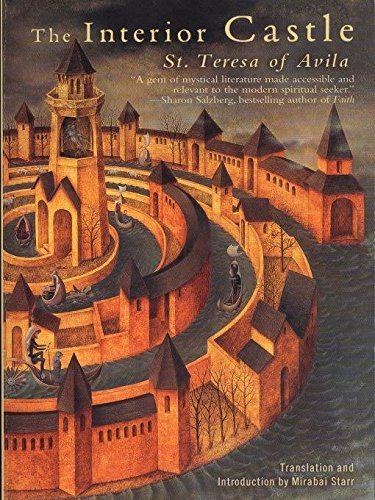
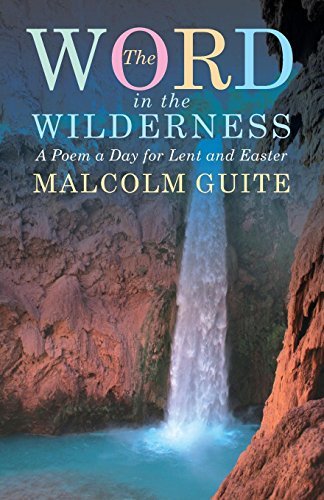
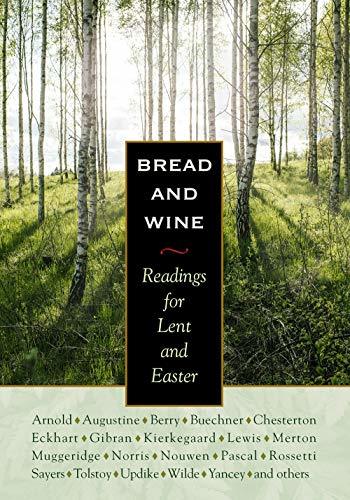
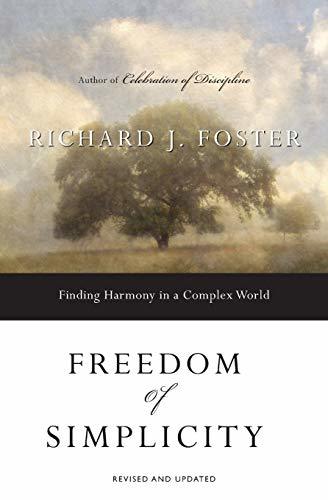
As you might have noticed, I am the sort of soul who does her spiritual excavation and growth often by the good grace of an excellent novel. I think stories reveal us to ourselves, help us to see the weakness or need we can’t always recognise in the day to day. To that end, these are the novels I’ll be considering in the next months: Till We Have Faces by C.S. Lewis. It took me three tries to get through this most strange and enigmatic of C.S. Lewis’s stories, but now, I am startled afresh by it each time I read it. The protagonist is one who wishes to accuse the gods of injustice, but how can she when she does not even know the motives of her own heart? A story that gets to the depths of our self-deception, our refusal of responsibility, our need for grace. The Heart of the Family, by Elizabeth Goudge is another; I would usually list The Scent of Water here, but I’ve realised how much I love this prequel to Pilgrim’s Inn (one of my favourite of Goudge’s novels). Here, two passionate souls contemplate an affair and are held from the brink by the question, what is truth, and what does it require of each living soul? Jayber Crow, by Wendell Berry; ah, a quieter, longer story of an imperfect, lover of a soul you’ll never find. There’s something long and tragic and beautiful about this tale of Jayber, the barber of Port Wiliam, with his secret, aching love for a noble woman, his loneliness, his recognition of what is lost in the world and wanting in himself and his belief in the endurance of love. And you’ve probably already seen my love for In This House of Brede, a novel about a powerful career woman who becomes a Benedictine nun. The tale of her journey into prayer, her grapple with an old grief, her slow journey to utter obedience has been, for me, a way of walking toward prayer myself.
FILM.I have been surprised what grace I have received in watching a few select films during the Lenten season. In this distracted age, when you can check email or facebook on your phone while typing an email on your laptop while watching a movie, I’ve found it an oddly comforting, and sometimes difficult discipline to put all my other work and worry away and give eye and imagination to the formative power of a good film. When I can manage that work, that release, I find that these stories draw me into a space where I am confronted by… sorrow, desire, my own yearning soul. This year, I’ll be watching… The Tree of Life. This is sweeping and symphonic, a world to encounter as much as a narrative. You have to enter this viewing willing to just experience, to be immersed in a questioning of nature and grace, light and darkness, sorrow and hope, suffering and evil, redemption, that is as much brief, vivid image, an impressionist collage of memories and moments in which the main characters choose between the life of ‘nature’ and that of ‘grace’. Of God’s and Men is a film that touched me deeply, based on the true story of a Trappist monastery in Algeria whose monks were caught up in the Civil War and terrorist activity that came to that country in the 1990s. Faced with the decision to abandon the monastery, and the people they deeply love and serve nearby, or stay and face possible death, their decision, their wrestle with what it means to be faithful in a fallen world, is the heart of this story. The Song of the Sea is a children’s film that unravels me every time I watch it. It’s a story about grief, about loss, about what happens when we do not face the dark places in our own hearts and try to push our need away. It’s hauntingly beautiful and charming, all at once. I’ll also be trying Into Great Silence this year…
ART.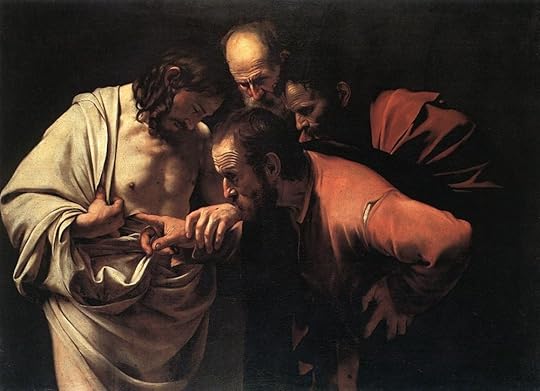
Every year, I find it a grace to be encountering a few pieces of art. I’ll probably share a couple of these in the newsletters I’ll keep up during Lent, but here’s a few images to begin. First, you all know how much I love Caravaggio’s The Incredulity of Thomas (above). Contemplating that picture has been so formative to me in learning what it means to touch, to accept the love I have been given. The love I need only recognise and reach out my hand to grasp. Eric Gill’s woodcut (below) of the judgement of Christ similarly astounds me in its simplicity and challenge. I think of Wendell Berry’s light ‘merciless until we can accept its mercy’ every time I see this; the hung head of the guilty, the great, inexorable light of Christ our King. And the painting, Compassion by William Adolphe Bouguereau (end of post) it is an image of such pathos and such gift. This is the gift we receive, the presence and compassion of Christ in this season of soul searching and abnegation.
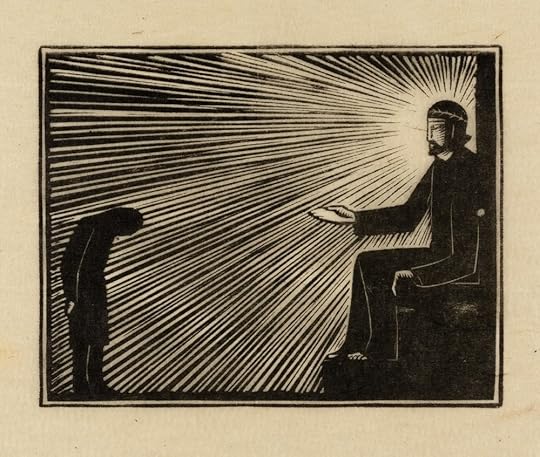
MUSIC.
Finally, here’s a Spotify playlist for Lent that I will be regularly updating with pieces of hush, of yearning, of contemplation.

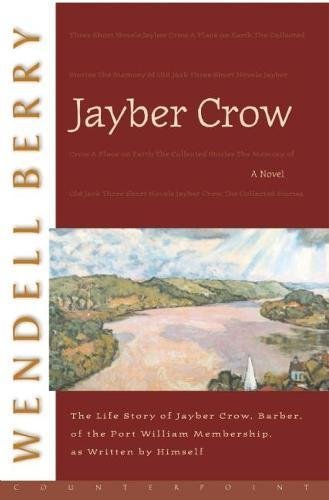
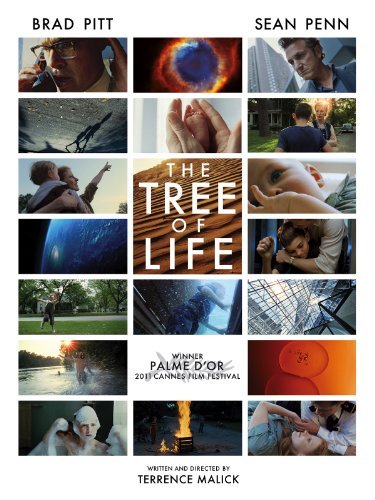
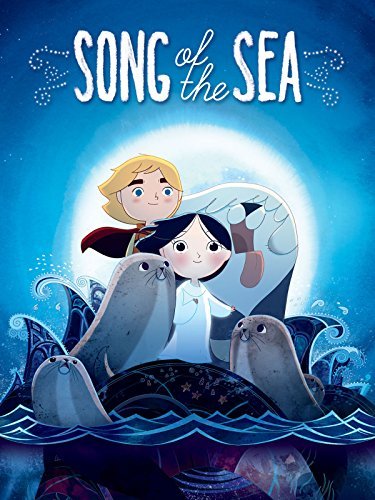
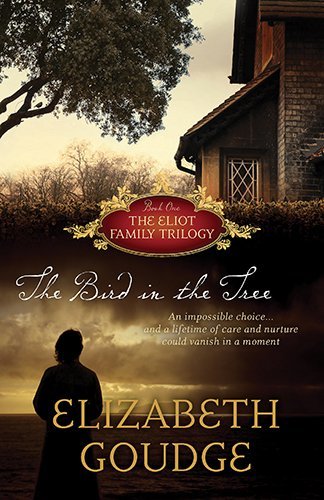
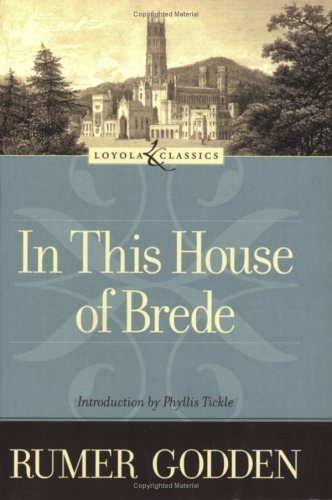
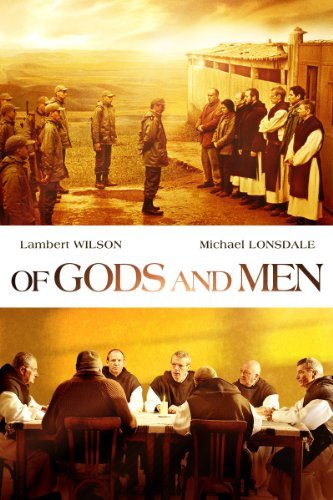
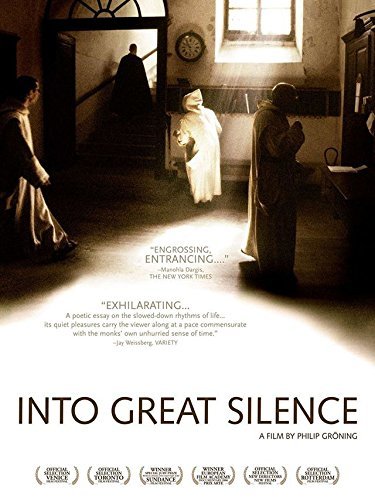
Friends, I find I need Lent this year so desperately much. My mind and heart are busy, far too busy, my eyes agitated in their leap from one deadline to desire to thing to be done to the next. I’m hoping for a space of prayer, of healing quiet in the forty days of hush that begin next week. I pray you find that quiet too, perhaps in the companionship and help of these small beauties.
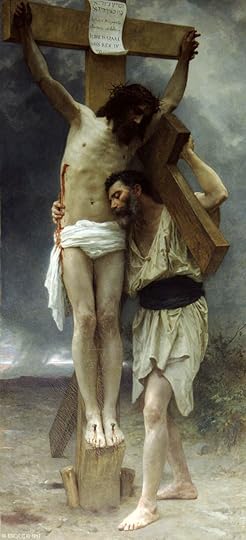
Compassion, William Adolphe Bouguereau
February 16, 2019
My (late) New Year's Wishes for You
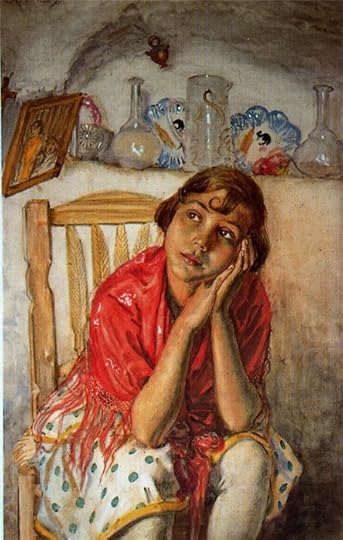
George Apperly
“I am thinking of Achilles’ grief, he said. That famous, terrible, grief. Let me tell you boys something. Such grief can only be told in form. Form is everything. Without it you’ve got nothing but a stubbed-toe cry—sincere, maybe, for what that’s worth, but with no depth or carry. No echo. You may have a grievance but you do not have grief, and grievances are for petitions, not poetry.”
― Tobias Wolff, Old School
I have always loved this quote from the novel, Old School, a story about a series of writers (like Robert Frost, Ayn Rand, etc.) who visit a private school in the 60s and teach the students there about what it means to write well. This quote by the salty old Robert Frost character burns in my memory and returns to make me thoughtful about the forms of my own existence. What he’s protesting here is the modern mania for free form verse, or even free-form emotion, the idea that form or order or structure confines us, inhibits our truest expression of self. Form doesn’t limit us, he argues, rather it directs and shapes the raw material of our experience so that we come to know it for what it truly is, grief or love, wisdom or conviction, something more than a shapeless cry in the dark.
I think the same could be said of our lives in the modern world. Something that has come mightily clear to me in the past years is the way that contemporary life often feels like a series of manic, fragmented actions as I leap between this project and that distraction, this deadline and that entertainment. Everywhere we look our attention is caught, then caught, then caught again… we express ourselves endlessly on social media but have little power or capacity for the work of presence, reflection, or… form. I think we live with a sense that our lives are increasingly random and fragmented. Where are we going? What is the end and aim of this ceaseless motion, this endless information?
In the midst of this wondering, I’ve been reading a brisk, luminous novel by Rumer Godden, in This House of Brede. She weaves the story of a modern woman who leaves behind the self-importance and frenzy of the world for a life as a Benedictine nun. And in the novel, I have encounter the grace-giving structure of the Rule of St. Benedict. A rule that orders the day by hours of prayer and work, rest and reflection. The nuns submit themselves to this rule of life, vowing obedience and stability, letting the shape of their individual emotion and giftedness be formed by the great, sacred scaffolding of prayer.
And I’m thinking with Bede, and Robert Frost, that form is something we are created for. Our lives were meant to be shaped by the rhythms and cadence of prayer, of worship, of quiet, of rest, the order of Sabbath and work, morning and night, the great, rhythmic music of existence we see at play in the natural world and in the worship of God’s people throughout the ages. We are meant for the forms of fellowship, of home, forms that draw us beyond isolation and into a great and living poem of love.
So when I think of what I wish for my readers, what I urgently desire for myself this year as I consider what kind of story I want to be forming for Lilian and myself and my marriage and home, it is this deep sense of form that I wish for us all. I wish us each a scaffolding of prayer and rest, work and beauty, that help to form our emotion and ambition, our busy days and scattered lives into something that becomes a poem, a living story that images the beauty and grace of God’s luminous reality.
So, friends, even if I’m a little late this year, here are my wishes for you.
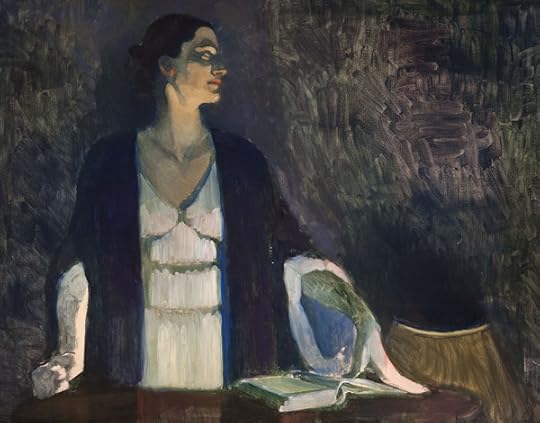
Violet Oakley, Study for Portrait of Edith Emerson Lecturing, Lake George
I wish you first, form. I wish you a fresh encounter with the great Mind whose wisdom gave birth to your own. I wish you a sense of dark and light, of the rhythm of the world with its appointed times for rest and work, growth and hush. I wish you the knowledge that your life isn’t meant to be spent in a random round of busyness but rather is meant to be formed by the patterns of worship and connection, beauty encountered and love spoken.
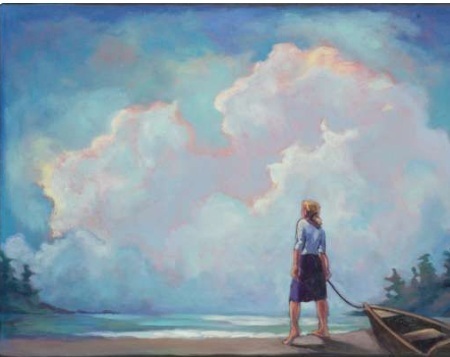
Carol Aust
I wish you quiet. Quiet, these days, is a radical thing because in order to claim it you have to turn off… the phone, the laptop, the TV, the music, the movie, the countless lines of connectivity. Quiet can feel a threat at first because it requires a somewhat sternly chosen disconnection. But when the furore of our thoughts begins to still in the wide, winter skied presence of silence, it’s chosen, cloister hush, we begin to be present here, now, to our own breath, our own aching soul, and the voice at the depths of our beings telling us who we are and what we are invited to become as we open ourselves to Love.

Johannes Vermeer, Woman Holding a Balance
I wish you wisdom within your quiet, more particularly, discernment. I wish you the difficult grace of choosing what is vital in your life as well as what is not, that which can (and must) be sloughed away so that the real and necessary things can grow. I wish you clear sight as you do this, a mind uncluttered by false guilt or cultural expectation.
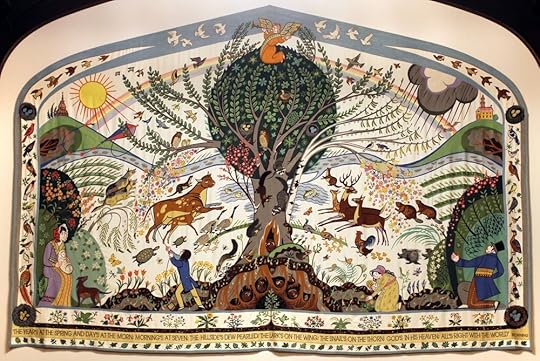
Pauline Baynes
I wish you vision. For the form and shape of the life you are called to create. I wish you joy in the freedom we have been given to choose and craft, to act as agents of a Creator God who formed and ordered the world and made us to be his partners in that work. I wish you a clear sense of your own life as a form of great, growing, enduring beauty.
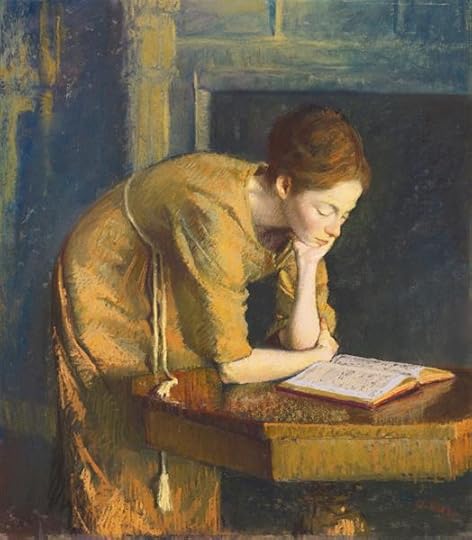
Aaron Shikler
I wish you words to help and quicken the forming. Stories and poetry, prayer and liturgy, words that may become a scaffold for your thought, your action, your contemplation, your prayer.
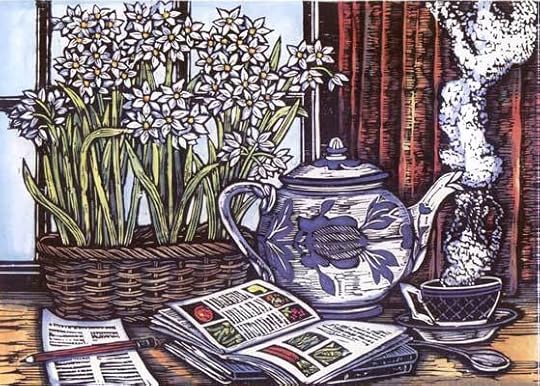
Mary Azarian, January Teatime
I wish you, in all this forming and ordering, countless small minutes of pellucid joy.
This is my new year’s wish for you.
December 1, 2018
Advent Companions: The Books and Music I Love in the Season of Waiting
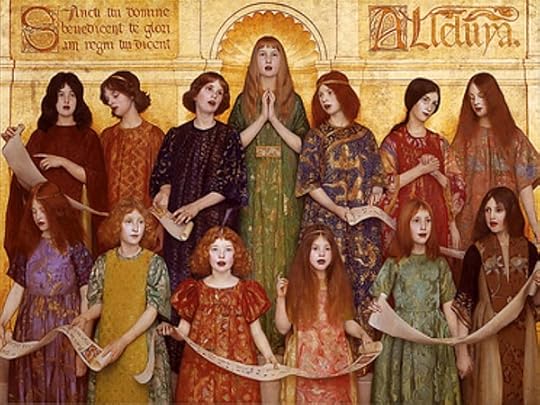
Alleluia, by Thomas Cooper Gotch
I almost didn’t go. The days die into rainy darkness about 4pm around here and I felt cold just thinking about walking out the door. My brain was listless and weary after three sleepless nights with my beloved baby and an essay on philosophy that I gritted out at 3am. My spirit was worn, and a little ill at ease after days without a single formal devotional or contemplative moment. I felt I barely knew what I needed or desired though if you pushed me to the wall I’m pretty sure I would have said I really didn’t have it in me to feel spiritual or contemplative or remotely prayerful. Yet that’s exactly what I set off to do as Thomas kindly (gently) shoved me out the door to take a little break while he put the baby to bed. And I found myself trudging down the wet, cobble-streeted dark, with a breathless mind and a weary body, to the Advent carol service at a church we love.
I felt on the way that it was a waste of time; I could barely focus let alone summon any worshipful attention. I was five minutes late. Someone handed me a candle as I slipped into the shadowy chapel, all long, dim aisles and vaulted, whispery cielings. I pulled my coat around me and tried to quiet my thoughts. The servers shuffled in, the choir rose, and in a blossoming of golden harmony began to sing the O Antiphons: O come o come Emmanuel… With each verse, each repeated, keening call for Emmanuel to visit his grieved and weary people, I, to my surprise, lost a little of my listless, guilty sense of needing to stand apart. I began to breathe more slowly. I began to watch the flames, to focus on the cross. I began to listen to cries of ancient longing that sounded strangely like my own. Second by second, note by note, word by word, I got woven back into the sphere of worship. And when the choir began to sing their anthem, ‘This is the Truth Sent From Above’, I was listening. And when they came to that verse -
Thus we were heirs to endless woes,
Till God the Lord did interpose
For so a promise soon did run
That He’d redeem us with a Son
Oh. In an instant my heart stirred into yearning. We, oh Lord, me, here in the shadowlands bearing the endless woes and toil of our good, hard, fallen, grieved days. Me, striving to be a gentle and good mother, working to learn and write, yearning to pray and forgetting to do it and losing my patience in the meantime… we here with all those small woes (and great ones too), we are the ones to whom this truth from above is sent: that He’d redeem us with a Son. I felt the yearning to be more than I am, to love more deeply, to know more fully, to return to worship rise up in me as my great sorrow and my real, returning health.
And this, I think, is a small image of what Advent does for all of us. From the clamour and work and grief and distraction of life in a fallen, modern, belligerent world, we are drawn aside into the chapel of Advent devotion. We are invited into a space where we can step away from the pained, frantic life that has become untethered from Love and come face to face with quiet. We’re invited into a moment of hush where we can learn to hear the music of God’s presence again. We often don’t know we even need it until we sojourn there a bit and find ourselves unravelled, and so achingly happy to be so.
Oh friends, the world is so loud and our hearts so harried and our minds so crammed. Step aside with me for a little, into the shadowed space of worship, of waiting, where the flames of love are lit like stars in the darkness and the voice of the Spirit himself sings our hearts back to wholeness. To that end, I offer you my best beloved books and music, companions for the Advent journey and the waiting season.
I’ve used many of these for years, and if you’ve followed me for awhile, you’re sure to recognise the old favourites! But I’ve added quite a few this year, and I think you will love these new discoveries as well. May your soul be hushed and your imagination enriched by these good gifts. Advent begins. Oh, I’m grateful…
My Advent Companions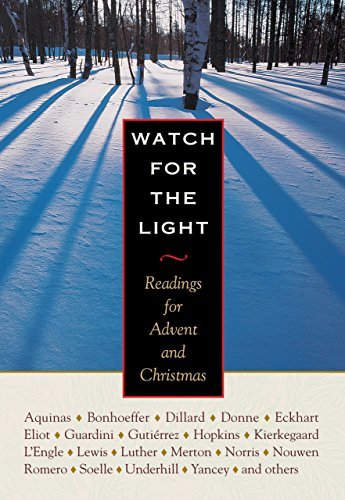
I first found this years back when one of its most arresting passages was quoted in a daily Advent devotional I received by email. Having found these words - But round about the horizon the eternal realities stand silent in their age-old longing. There shines on them already the first mild light of the radiant fulfillment to come. From afar sound the first notes as of pipes and voices - I hungered for more of the same. And my hunt led me back to this collection of stirring Advent contemplations, one a day through Epiphany. For a book that sets you in the strong, clear light of Advent as a season of preparation, even of penitence, this is the best. The readings here aren't meant to evoke nostalgia or even comfort (yet), but to help a reader come wide awake, to take account, to consider what it is she hopes and what the coming of that hope means to the here and now. For 'preparing a way for the Lord' in my heart in this season, this book has long been a brave and resourceful companion.
God with Us, edited by Greg Pennoyer and Gregory Wolfe
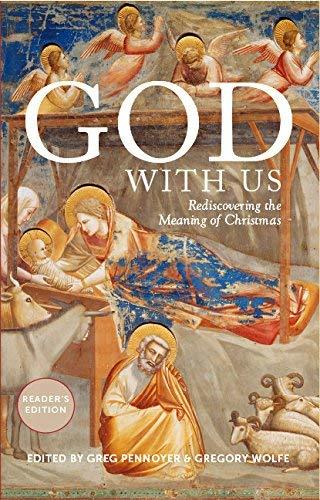
This book is a luminous companion, prepared by the faithful and creative minds behind the literary Image Journal. This book offers carefully selected pieces of art, daily Scripture readings and prayers, and daily Advent devotionals, each week written by a different Christian writer or pastor. This is an ideal Advent devotional book as it offers a compact but rich contemplation, short enough for a snatched quiet time, but rich enough in image and idea to shape one's thoughts for the whole day. It's a world of a book, a twilit, contemplative, Advent world.
The Art of Advent: A Painting a Day from Advent Through Epiphany by Jane Williams
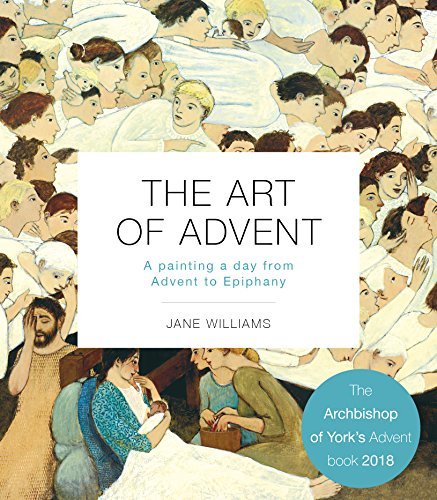
This book is just out, and I ordered a copy the minute I found it. It’s little, which means it fit in my bag for an overnight weekend with ease, but it contains a collection of art to startle and hush, to demand attention and aid contemplation, with reflections by Jane Williams, an author and podcaster known here in England. I am so excited to savor this book and have already loved the first reading, themed on light and darkness, centred on Blake’s startling image of the Ancient of Days.
Waiting on the Word, by Malcolm Guite
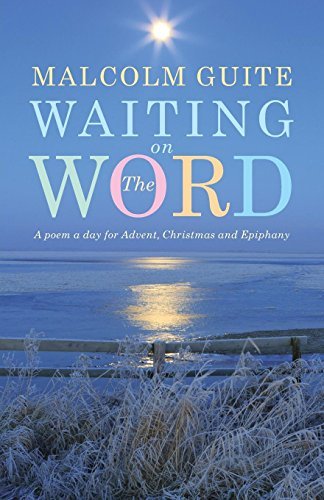
Poetry, as Owen Barfield insightfully claimed, can bring about 'a felt change of consciousness', a process that I think is at the heart of Advent celebrations and one that is masterfully crafted for a reader in this collection of Advent poems by Malcolm Guite. Guite's Lent collection has been my companion for the past two years, and the Advent one is a new favourite. Guite doesn't just give you a poem to read, he guides you into the heart of the woven words, words that can truly shift your sight from boredom to wonder, from discontent to thanks, from discouragement to a newly-kindled hope. Combined with his own radiant sonnets, this book is a gift of lyrical beauty and devotional quiet.
Haphazard by Starlight by Janet Morley
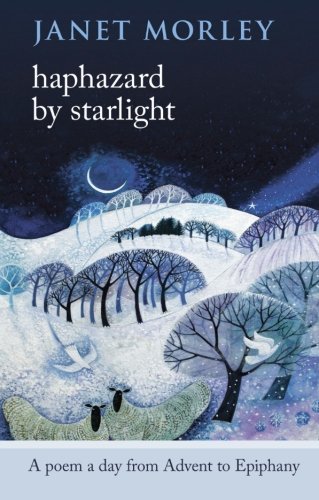
This is a similar collection to Guite's, one I have just discovered. It comes highly recommended by my tutor here at Oxford, and we are using some of the poems listed within for an Advent poetry discussion group. I love the way this book introduces me to poems I would never have discovered on my own. And, I mean, the title. Splendid thing.
Advent with Evelyn Underhill, compiled and edited by Christopher Webber
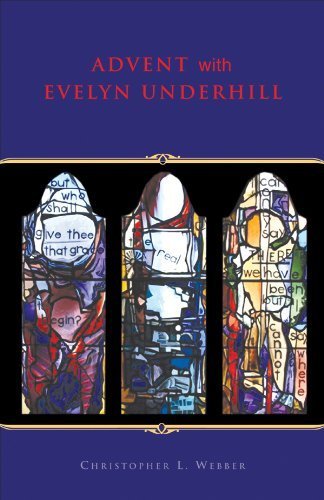
I make no secret of my love for Evelyn Underhill. Her confident, motherly voice in writing, not to mention her excellent scholarship on contemplative prayer and Christian mysticism, has shaped my devotional life in countless ways. This collection of daily Advent readings has been culled from her many devotional works. These are short, accessible, luminous and for me, powerfully formative readings you could peruse in a spare 5-minutes. I've taken this book along to the airport to read in the waiting area and the pithy, wondrous tone always startles my soul awake even in the midst airport craze.
The Glorious Impossible text by Madeleine L’Engle, OR The Nativity , text by Geraldine Eischner, art (in both) by Giotto
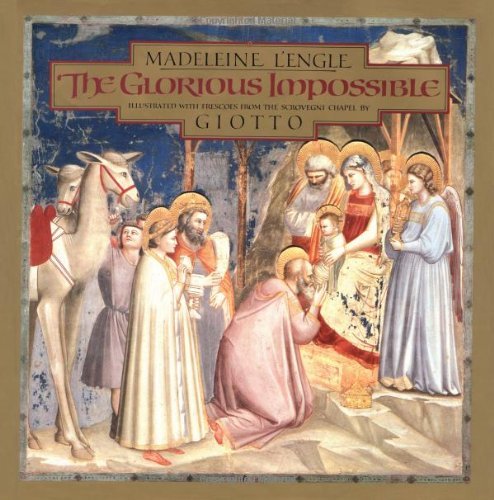
Every Christmas of my childhood, Giotto’s art arrested my eye in this book, brought out only for the Christmas season. The gentle or awed or anguished faces, the faded gold, the strange figures embodying a story I knew well, making it new and strange, and yet closer again… I have encountered few pieces of art that so capture the ache and wonder, the pain and passion of Christ's coming into this world. I think that art arrests the mind in a different way than words, allowing our eyes a fixed contemplation in which our imaginations 'see' the story of Christ afresh. In the book I grew up with, Madeleine L’Engle’s lovely prose accompanied the pictures and if you can get your hands on a copy, I highly recommend it. The contemporary (and in print) version by Geraldine Eischner is good too.
The Nativity by Julie Vivas
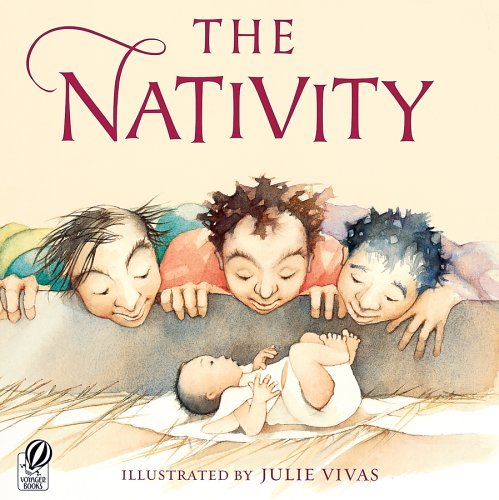
Lilian received this as a christening gift (I think) and I have been absolutely enchanted with it. Just the simple, Bible text recounting the story of the annuncation and of Jesus’ birth, yet with illustrations so magical I find myself smiling as I read. The sweeping, earthy, humorous images in their gangly contours, the lively, joyous faces, the delight of seeing the annunciation depicted as Mary and the angel sitting at a table over coffee, I just love the humanity and humor of this story and the true, pure wonder it conveys at the same time.
I Saw Three Ships by Elizabeth Goudge
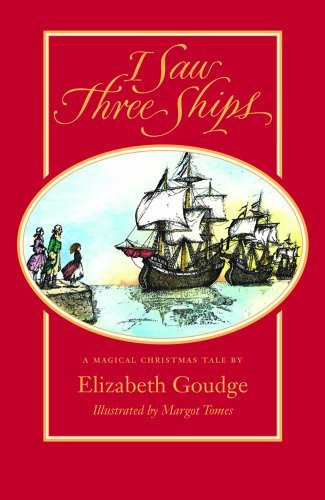
I only grow in my love of good short stories. This one, in a simple, tightly woven little tale manages to tug hard at every hopestring in your heart, combine childhood Christmas delight with grown-up yearning, and bring it all to an end that, I must admit, brought tears to my eyes the first time I read it. It's a gem of a story, an emerald gem, bright with all the life of Christmas if you ask me.
A Christmas Book also by Elizabeth Goudge
A collection of Christmas short stories, some excerpted from her longer novels, some written purposefully for the book. I love that I can sit down for half an hour with a cup of tea and finish a whole, small tale that yet makes me feel I’ve sojourned in a good, spiritually nourishing place. The lively and eccentric characters, the humour, the spice of mystery, the presence of the sacramental in the lovely, all the usual goodness of Goudge comes as a gift in these small stories.
Christmas in my Heart by Joe Wheeler
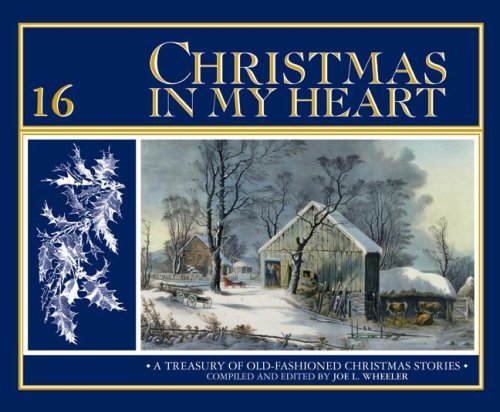
Joe Wheeler is one of the best and oh so dearly beloved anthologists we have in the States and I was deeply privileged to have him for a mentor. I love these Christmas books, collections he has culled from the reading of thousands of old books. My family used to read these aloud in the evenings during Advent season… and we might have had bets on how quickly mom would tear up. Now I’m the one tearing up… they are sweet, funny, good, family-affirming, old-fashioned tales to enrich the season.
The Silent Bells by William MacKellar
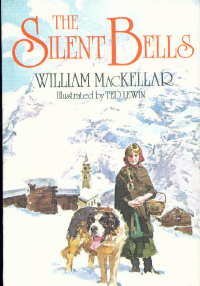
A lovely friend sent me this book last year and it has joined my stack of favorite Advent short stories. Set in the Swiss Alps, named for a set of cathedral bells that have never been heard but are prohesied to ring with the coming of a certain gift at the Christmas Eve service, the book is the tale of little girl's generous heart. It's a dear story, one that stirred my heart. I look forward to reading this to Lilian.
Midwinter Carols v. 2 by Joel Clarkson

My wondrous brother Joel just released an album of tender, lively, oh so richly woven but oh so quietly rendered carols for Advent and Christmas. I’ve had this album on repeat in the last days with Lilian and it brings such a subtle, rich beauty to our moments.
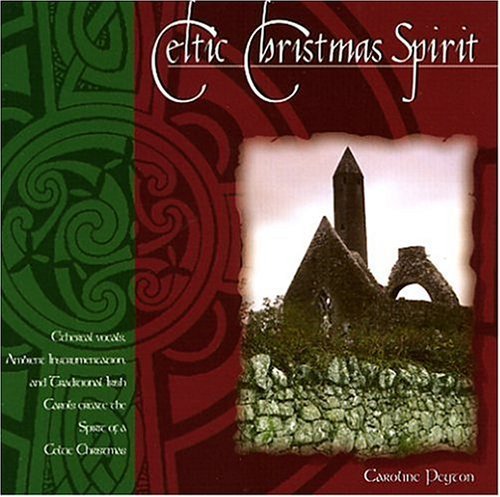
Celtic Christmas Spirit by Caroline Peyton
While this isn't strictly 'Advent' music, I find the haunting quality and some of the more ancient carols in this collection help me stand aside from commercial, contemporary Christmas and engage with Advent. I haven't found anything quite like this collection of Celtic Christmas music. Granted, my taste for the lilting and haunting runs strong, but there is a wonder and glory in this that I savour.
Behold the Lamb of God, by Andrew Peterson
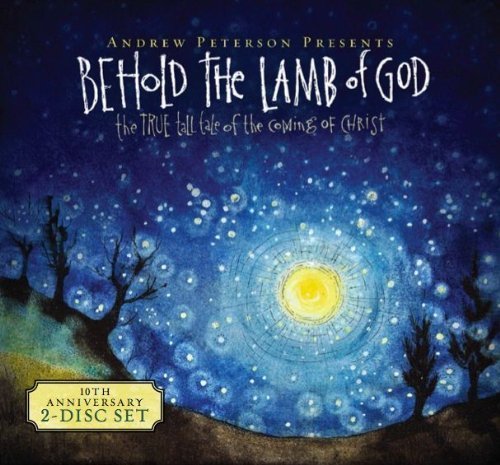
Ah, this is an excellent journey of music, one that draws you into the high drama of angels and the sweet, low folksy drama of the stable in songs you will find yourself singing under your breath throughout the season. Andrew Peterson's storytelling in song, his grasp of the storied nature of faith, has made his music among my favourite for many years, but this album, inviting you to 'behold the Lamb of God' is one that has enriched my Advent journey in countless ways.
The Promise: A Celebration of Christ's Birth, by Michael Card
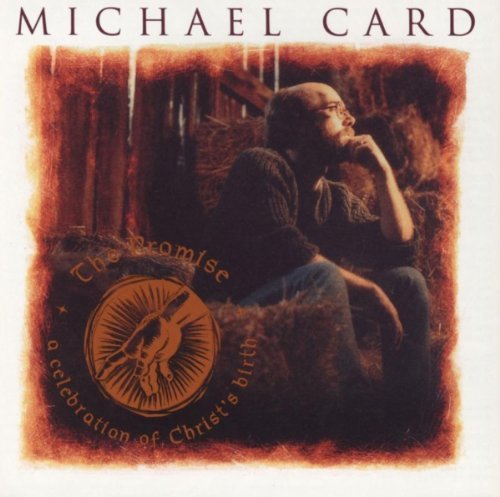
I grew up on these sweet, sweeping, and to me, rather haunting contemplations on the coming of the Christ child. Michael Card's music has companioned me lifelong, and I love it for its scriptural depth, its engagement with the whole of the Bible's narrative, combined with its richly imaginative lyrics. From the prophetic and dramatic tones of the opening song The Promise, this album progresses through the Christmas story through the eyes of the different people caught up in its glory. Whether in Mary's lullaby-like tune and aching wonder, or Joseph's awed contemplation (how can it be?), I find this album touches my heart with a quieted sense of worship.
Midwinter Night's Dream by Loreena McKennit.
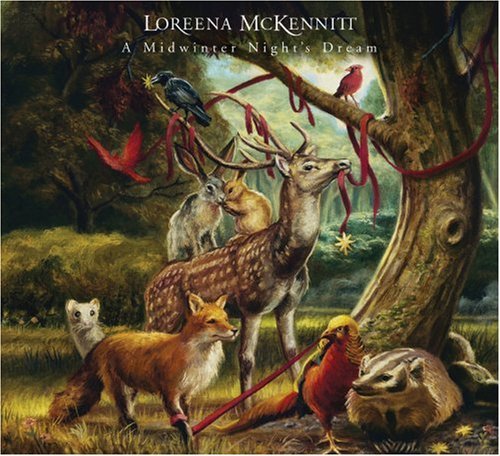
Loreena's music has been beloved of my heart since I was a small child and heard her haunting setting to tune of a Yeats poem. The lilting quality of her voice, her love for the Celtic, her re-rendering of the old folk tunes I always wished I could discover make her a musical companion for all seasons. But I especially savor this collection and play it often in the Advent season, a gathering of more traditional hymns, carols, and yuletide songs whose lyric and melody evoke a feeling of wonder for me.
Handel's Messiah, by, well Handel.
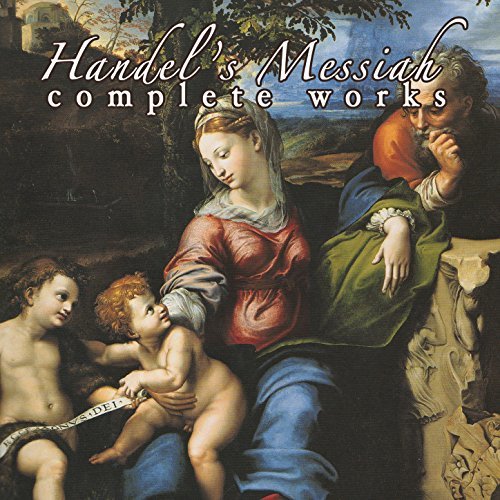
I have listened to this masterpiece on repeat for the past few weeks (I need it!), but this marvelous creation is always an accompaniment to my Advent season. This is a world of a work, an epic of storied music recounting the whole history of Christ's coming, leading us prophecy by prophecy by promise, in some of the most glorious choral music the world has known, into the hallelujah heart of what Christmas truly means. Listen to this repeatedly, let the story of Scripture soak into your memory and heart and tell me if your mind isn't formed a little more to wonder each day.
Also, there are several books of projects I’ve just discovered this year that I am downright determined to explore and very excited to experience. I haven’t read them yet, but I’m pretty sure they’ll deserve a place on the list of my Advent beloveds:
One Night: An Illustrated Advent Calendar by Adam Farbiarz
I stumbled upon this as a kickstarter project and it absolutely enchants me. An illustrated Advent calendar with each door opening to a different narration of the nativity story.
Come Lord Jesus: The Weight of Waiting by Kris Camealy
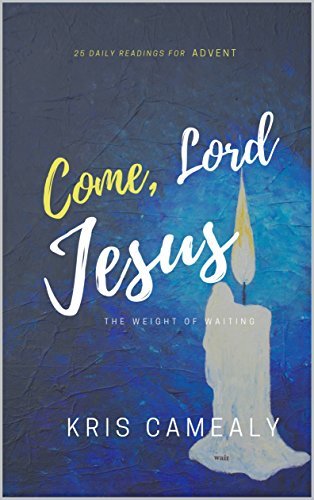
Scripture, reflection, prayers, questions carefully composed, powerfully applied. I love the sample I’ve read; Kris speaks with clarity and gentle grace to the burdens and desires of our faulty and yearning hearts.
Wounded in Spirit: Advent Art and Meditations by David Bannon
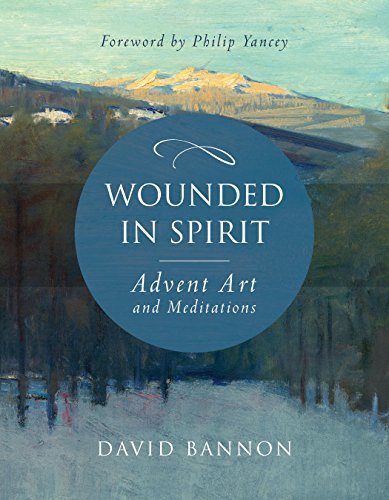
With my fascination by the way art and story accompany us in our suffering, I just cannot wait to get a copy of this book, a collection of art and contemplation crafted as a companion for those who grieve or suffer. One of these days, I’ve got to figure out the whole request a review copy thing…
The Advent of the Lamb of God by Russ Ramsey
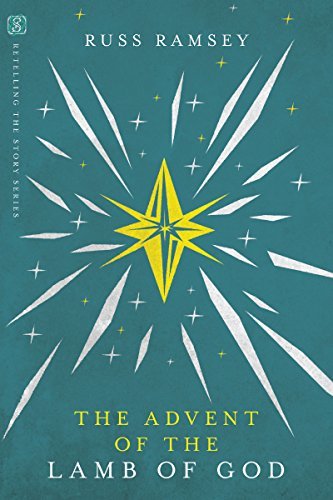
A vivid and creative retelling of the story of Christ’s coming, woven by a pastor with a heart to make the real, true advent of Jesus a story we can encounter as our own reality.
And friends, there you have it for now. Oh my goodness. Let the Advent journey begin and may it, oh may it please, be blessed. Here’s a spare poem to excavate your heart as Advent begins tomorrow:
Advent Calendarby Rowan Williams
He will come like last leaf's fall.
One night when the November wind
has flayed the trees to the bone, and earth
wakes choking on the mould,
the soft shroud's folding.
He will come like frost.
One morning when the shrinking earth
opens on mist, to find itself
arrested in the net
of alien, sword-set beauty.
He will come like dark.
One evening when the bursting red
December sun draws up the sheet
and penny-masks its eye to yield
the star-snowed fields of sky.
He will come, will come,
will come like crying in the night,
like blood, like breaking,
as the earth writhes to toss him free.
He will come like child.
November 21, 2018
Fearless?

For many years, I simply couldn’t talk about my OCD outside of the fortress safe circle of a very few beloveds. Friends, I couldn’t even write about it in my journal. The condition of having a mind peopled vulnerable to episodes of vivid images of darkness and disaster and a heart terrified by it felt so shameful, so shattering to who I thought I was and what I want to be. It made feel alien to myself let alone the rest of the world, unsure of what it meant to love beauty or trust God when this darkness was my constant companion. I wrestled with the reality of my broken mind for a long time, and with the fear - of rejection, of disaster, of being misunderstood, of losing those I love, of failing - that is so core to this fractured way of thinking. I did it largely alone, unsure of how to explain it all to the sane, successful world that sometimes seemed so very out of my reach.
But the last few years have shifted the landscape of my inmost soul. Moving to Oxford meant facing down huge fears of loss or separation. Studying theology here meant finally getting to ask my hardest questions about what it means to love Jesus, to believe in his power, and still to know myself broken, to be aware that there are nights when prayer or Scripture have no comforting power and all I can do is ache in the endless shadows of the small hours. Theodicy, the study I’ve mentioned a few times here, and the bearing of a fragile little baby that who has my heart and its fears in a tizzy, has finally pushed me to a place where I want to write about the journey and grapple of my own darkness because I’ve realised something crucial: fear is the battle of every person alive. To live in a fallen world is to be afraid, but we are called to journey out of that fear by a person whose coming was foretold with the words “Fear not!”
So I want to write more about being afraid, because I am beginning to understand that it is the condition, the inescapable backstory to the journey we walk and the stories we live in faith. Our lives are formed largely by our choice to listen to what makes us afraid, or to hear the voice that calls in and through our fears, drawing us toward hope. I posted yesterday on Instagram about that fear and was so struck by the comments of those who are also walking and trusting, struggling and grieving and it made me remember a post I wrote three years ago and never published because I wasn’t quite ready. I think I’m finally ready and I’m posting it here to start a conversation. I want to write more in the coming years about the wrestle and dance that is our journey toward Beauty from the darklands of the Broken Place. This is one of the deep themes I feel beckoned to explore. So here, today, is a post I wrote about being… fearless? Maybe not. Read on:
"You must never feel afraid. I mean, you travel and study abroad, you try new things. It's hard for me to imagine that you ever feel afraid."
The world didn't so much halt at the words of my friend, as dim. The nod I had ready froze. I blinked, but couldn't clear the sudden inrush of remembered panic that tinged the room around me, distanced me from the present. I couldn't keep back the fear my friend thought I never felt; it was a bitterness on my tongue and a hot crawl of fingers down my back. With my impending departure overseas, again, I'd tried to keep the old dread at bay, the wild, almost inchoate fear I feel at leaving those I love and flinging myself into a new place. I'd fixed my grin and steeled my soul. But those words unlocked the door of my heart where the darkness dwells, a incapacitating insecurity that I have known since childhood at every separation or change. I took a deep breath as the onslaught nearly knocked the breath from my lungs.
Never feel fear? Sometimes I think that my much of my hungry, determined, creative life is a defiance of the black fear that would bind me like iron to a tiny realm of predictable hours for the rest of my life if I let it.
On a blog like this, written by an introvert like me, with a life already a little too public for comfort, I often wonder just how much of my story to tell. But I've been here for three weeks. I've settled my soul, and tasted goodness as if were a ripened fruit placed in my hand. Aslan is moving in me and in this city; I can feel his breath roving the streets, stirring new thoughts in my inmost self. But the truth of the matter, the truth I think I'd be lax not to tell, is that I almost didn't come. I almost didn't taste the quickened life, the autumn beauty, the friendships and stories; the rich feast of learning laid out for me here.
Truth is, I've almost stayed home from every adventure I've ever undertaken. Oxford studies. Ministry. Roadtrips. Study. Because fear is a latent presence in me that rises to rage at the first hint of change. It's been given various names through the years; OCD, anxiety, disorder, you can call it what you will. But if I had obeyed its voice, a mesmerizing voice like Saruman's, tinging every image and future with peril, I would be little better than a prisoner, locked in my room, and in my own mind. Because it never gets any better, you know.
There's always a moment on the plane, about three hours into the overseas flight when a sense of spiritual isolation comes upon me. I look out the window, feel myself suspended in that airplane like a buzzing fly in the black honey of the trackless night. With all the little seat lights off and the strangers around me asleep, I waken, eyes red and wide and bright, to fear. I imagine the loss of every person I have loved. I berate myself for leaving. I wonder if I have contravened God by choosing the life I have. Images pound upon my thoughts; of people I love hurting, lonely, struggling, because I have left. Of the people I cherish in anguish, or ill, or dead. In that night moment I can almost taste the grief I will know in the death of those I love. The chill of the airplane cabin seeps into my skin. In the blackness, I feel unmade, unnamed, unknown, alone in "measureless oceans of space."
There's always the jetlagged moment when I arrive in my tiny little student room of some sort with grey walls and yellowed light. Every atom, every surface and smell declares itself foreign. I move within my new environs with a pained clumsiness, as if something vital in me was sick. The paralyzing shyness I knew as a teenager stiffens my muscles. I feel that I have forgotten how to make friends, how to form sane, balanced words. I sit in the dining hall the first night, and grope after conversation like a blind woman in a room full of rocks even as hunger for home racks my heart. Every word feels wrong. I stumble. I bruise. And I know that a sleepless night will follow. My heart rate will rise to a point where sleep is impossible. I'll close my eyes and the hot, sticky panic of separation will beat in my blood. And I'll think, at about 2:53 am that it would be best just to book a ticket home. Every ideal I've formed and conviction I've known will, in that instant, seem null and void.
And then will come the moment when I wake to the dim grey line of morning. I will look around me at the bags I haven't unpacked and the clothes I haven't folded. I will stare down every inch of my foreign little room until it meets my gaze. I will sigh, very deeply. And then I will rise with an exertion of will that feels like the lifting of massive weights, and I will do what I have done every adventure before: I will begin to build a life. I will open the window and let the stale air of the night seep away. I will fold my clothes and order my things. I will email my mother, and battle that black, hot darkness of fear with every atom of order and loveliness I can muster. I will pile books, find posters for those yellow walls, cram flowers in whatever random jug I can find. And when the panic comes, that hunger for home, that fear of losing all I love that riddles and shakes me, I will stride out hard down whatever new path I can find. I will walk until I have enough air in my lungs and sanity in my eyes to rasp a breath prayer I found in The Scent of Water: "Into thy hands."
I suppose the reason I want to tell this tale right now is because I cannot shake my friend's statement. I cannot escape the impression that she thinks we are fundamentally different in our orientation to the world; that she is afraid, and I am not, and that enables the life that I live in a way it never could for her.
The truth? I think that most of us live with crippling fears. Or at least more fear than we admit. We fear the unknown or our own inadequacy. We fear what people think. We fear old secrets. We fear failure. We fear loneliness. We fear our own despair. But when we won't admit or share the fear that stays our feet from going, our hands from reaching, our hearts from loving, we often dwell deeply in shame. Convinced we are the only ones with this malady, we do not name the battle that rages within us, and we never quite fight it as we ought. We stay home, whether in body or heart. We draw back from the people we think have the courage we lack. We speak less and we dream less. We stand more and more alone.
Fear, I've learned, is the great isolationist. He is the flattener of friendship, and thief of hope. In my early teens, when the panic that has plagued me ever since first reared its head, I remember the way I hid myself from others. First, from even my family. I put my body through hell trying to conceal my struggle. Then, from my friends. I went less and less to groups. I walked very much alone. I felt that if I confessed what I truly felt, hour by hour in that crisis time, they'd all abandon me anyway. I drew into myself and ceased to speak, and I was an island that few could reach. Fear, you see, sets us far apart from each other, and so from the love that is the only antidote I have ever found.
For only in love can fear be fought. C.S. Lewis once famously said that friendship begins when two people discover a common view, "what, you too? I thought I was the only one..." Courage begins that way too. The way fear shrinks when confessed is startling. It often shrivels to half its size when forced into the brisk air of articulation. But when those words are spoken to a friend, the strength between them becomes a shelter in which fear can be held at bay. When I first told my mom of all that was raging within me, after days of pushing it down, she simply drew me to her and whispered that all would somehow be okay. In that instant, half my terror abruptly ebbed. And when a women I held to be a heroine admitted to panic attacks just like mine; a person who traveled, who risked, who moved through life with what seemed an effortless ease, I thought what, you too?, and began to believe that fear did not have to define my story.
I'm glad I've reached the point where my friend thought me brave. But I'm heartily sorry she thought me fearless. For how can I stand by her in the fight if she thinks she cannot tell me she's afraid? How can I stand by you?
So let me be honest. Let me here speak of the fears I've held often in silence, for I see small meaning in writing for the sake of words alone. If what you read here doesn't name the things you struggle to tell, then grip you by the hands and help you on your way to hope, then I don't see the point. I know that much of what I write here is focused on beauty. I want to feast on thought and song and wind and starlight and story in this space with you. I live by affirmation in all that is lovely, but that is largely because I have chosen to use my words to speak the hope I often don't feel. My drive to ideals, my push toward adventure, my flint-faced love of beauty are my answer to their opposite, the voice in my own heart that would straighten and bind me if I did not fight it with grace. I'm often afraid and I want you to know it. Are you?
If so, let's fight together. Let's name the fears that make an awful question of our souls, and answer that question with life lived full and hard, in fierce, creative defiance of all that would limit and bind us. Let friendships grow here in the soil of shared battled, and chosen hope. Let's live out love and trust that it will truly, one day, cast out every fear.
What? You're fearful too? And I thought I was the only one...
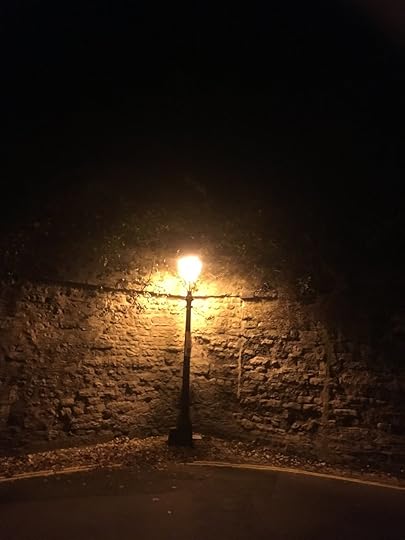
October 2, 2018
Seven Values for Learning
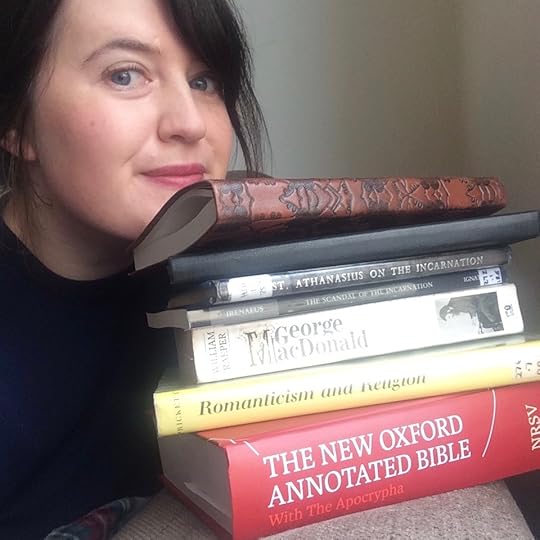
Four years ago, almost to the day, I was seated in an echoey Oxford lecture room with a rainy day out the window at my back and a tutor with wise, kind eyes at the podium in front. I was still a bit jetlagged, jittery with my own nerves and slight insecurity and excitement to be a student, striving to focus but also wondering how in the world I was ever going to get all my essays in on time, a little afraid of being lonely, wondering if I had the capacity to do what I had dreamed. The voice, and message, of the tutor who spoke that day cut straight through my jangled and doubting thought with a focus and hope that became a foundation for the three years of study that (unexpectedly) followed.
And in many ways, for my life as well. What the tutor articulated that day was the vision and argument for faithful, intellectual engagement. I found his words convicting and empowering, ideas that undergird my commitment to the reading life, and even the way I live out my faith. These are ideas I think we should all be shaped by, because I strongly believe that we are called to be learners, readers, those reaching for understanding as we journey toward wisdom and maturity in the company of Christ. As October opens, with its crisp air, its firesides, and that return to home and study that is so rich a part of this season, I thought I’d share these principles again. Perhaps they will spur and inspire your own mind in whatever corner you find yourself today.
(My tutor was James Robson, and I share these with his permission. The points are his, and I expand a bit upon them in my own words.)
Informed :: The aim is to dispel ignorance. To know what we know with great depth and intricacy, whether that is the nature of God or the function of language. To read, question, and wrestle with those who have gone deep in thought before us, and to then form our own beliefs in conversation with them. I’m reminded here of how language expands our consciousness. How each word, thought, or imagined figure enriches the inner soil from which our belief, creativity, and selfhood grows. To learn, to read, to be informed is to widen the horizon of spiritual imagination. In learning, we become more than we were before, and our capacity to give expands as well. What a privilege, then, to learn, and what a gift.
Humble :: We see in part, each limited by his or her own point of view. We see one aspect of the world, one facet of the cut, shimmering diamond of reality. We must value what we know, yes, but recognize its limitation. We must always be willing to question, or expand our ideas based on the challenge of Scripture. I’ve only been here a week and already I have heard so many stories, heard so many passionate ideas stated, and formed new friendships with people from vastly differing cultures and histories. My concept of the world has expanded. I am keenly aware of both my own unique story, and the fact that it is one of countless histories adding to the great Story of God. In that context, there is no room for pride of place.
Critical :: Is this right? God gave us minds to discern between the good and the bad, the true and the false. Our learning is meant to strengthen us in this endeavor, so that we can ask the questions that must be asked about soul and mind, Church and culture. We ask for evidence, we read vigorously, we think with rigor. I feel often paralyzed by the plethora of choices, opinions, and beliefs encountered in the space of a day. This particular value is a tonic to me; an assurance that with Scripture, study, and careful thought, I am fully able to discern what is right, what is good, and what that knowledge requires of me. Life’s more simple than it seems when a cool mind and a peaceful heart are in place.
Analytical :: Here, we practice the discipline of logical thinking. We learn to ask the questions that get to the pith of the matter. We learn to discern what is truly being stated, asked, or assumed in the thoughts of others. This, after my various spates as a student mentor, strikes me hard. One thing I had to learn in mentoring others was that often, the question verbalized wasn’t really the question being asked. To discern what truly is at stake, to ask the kind of questions that lay open the heart of a matter is a discipline I’ve had to learn with much last minute prayer. Of course, academically, this value is straightforward, more about intellectual clarity. Clarity of thought. And brevity. Those will take some work!
Independent :: We are self-starting, self-driven educators who take ownership of our learning. Part of this is a resistance to herd-like thinking. We think in community, certainly, but we think independently as well, willing to question instead of simply assume. And this is why I’m at Oxford. “Think of yourself,” said a new friend here, a little ahead of me on the same course,” as a scholar in training. You’re just a ways back from the great ones, but you’re on the same path. And you have to do the same work with the same integrity if you want to follow them.” Hard work, that, the discipline of setting essay schedules for myself, doing the extra bit of research I really could skip, answering the question fully instead of in part. But an honor too. To be trusted to learn, to do work worthy of a tutor’s time. And then to take that learning, apply the same independence and give it back in a meaningful way to the world. Beautiful challenge.
Integrative :: Our learning must rightly enrich our actions. Theological study must enrich and further our discipleship. Otherwise, it is a useless endeavor. Oh, this beauty-loving, life-making girl loves this. Our contemplations must find meaningful, embodied expression. To hold knowledge apart, in an isolated box in our minds, is to make it meaningless. It must be applied, lived, incarnated into every aspect of the lives we live here, the loves we give, the legacies we are building. If what I learn about the Old Testament prophets doesn’t teach me how to tell the truth in my own time, how to love the people God is calling to himself, then the hours I spent upon it were worthless. If church doctrine classes don’t equip me to speak, in the language and metaphor of my own time, the living language of Christ, then I have learnt nothing at all. This learning must be a part of “life and life to the full,” life rich in the beauty and quickened light of Christ.
Faithful :: We learn in order to know the living God. Michael Lloyd, the principal here at Wycliffe, in a talk given just before this one, commented (I don’t have notes so I’m paraphrasing) that theological study is, at base, the study of Love. In that light, I understand every jot of my pen here, every page of old text read, every essay eeked out in the wee sma’s as a journey deep into Love. And a rigorous training that will give me the mental acuity, the written and verbal fluency to make Love plain in my time.
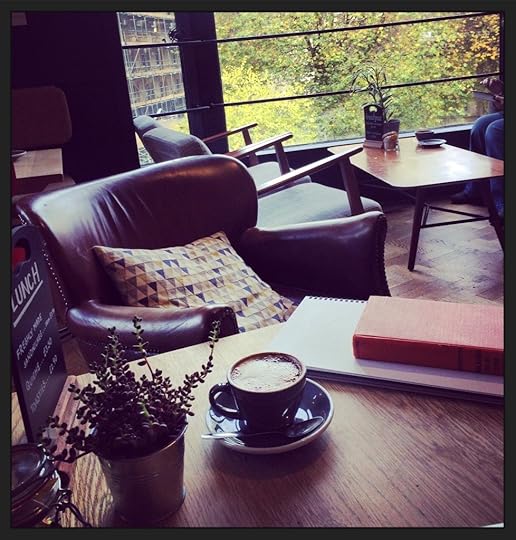
September 4, 2018
Launch Day Headquarters: Your Guide to the Book Girl Festivities TODAY
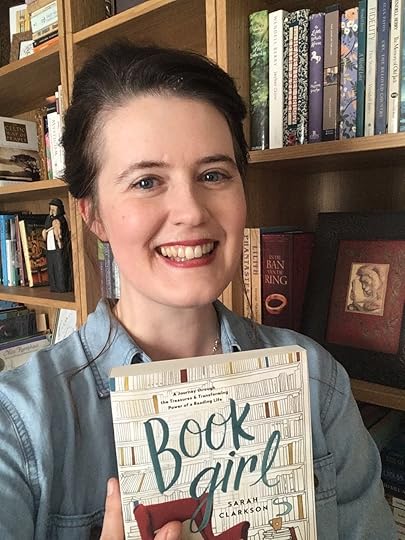
Book Girl is here!Oh goodness, friends and world, it's here! Book Girl is making her way into the wide and wild world this very day and I have to admit, I am pretty darn excited. It's a startling thing to see something that has simmered and hummed in the back of your mind for years arrive in your hands as a bound book, a little parcel containing the truth you yearn to give the world. In honor of that arrival, I'm hosting a whole day of literary delight and giveaway fun. Oh friends, please join me throughout the day at all the events listed here, and thank you for all your encouragement along the way! Let the festivities begin:
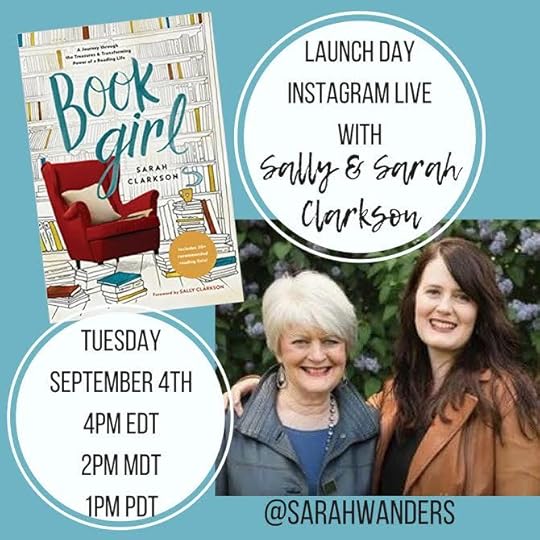
1. Book Girl Launch Live Event!
Tonight, from the cozy corners of my tiny Oxford living room, crammed as it is with bookshelves, I'm hosting a launch party with my Mom. We will have such bookish fun complete with candles lit and favorite books piled round and something delicious nearby. Gather your own friends and join us. A tentative outline for our evening includes:
- Read aloud from my favorite passages of Book Girl.
- Live giveaway of Book Girl to those attending the event.
- A tour of my bookshelves including quotes from the books I most love
- Your questions answered - you can submit them today through the story in my Instagram (@sarahwanders)
- My mom and I sharing what it means to us to be book Girls
- My mom and sister Joy sharing about a few of their favorite books.
It will be such fun! Join us on my Instagram Live (@sarahwanders) or my mom's Facebook Live (facebook.com/therealsallyclarkson) at 9pm British time or 4pm Eastern, 3pm Central, 2pm Mountain, 1pm Pacific.
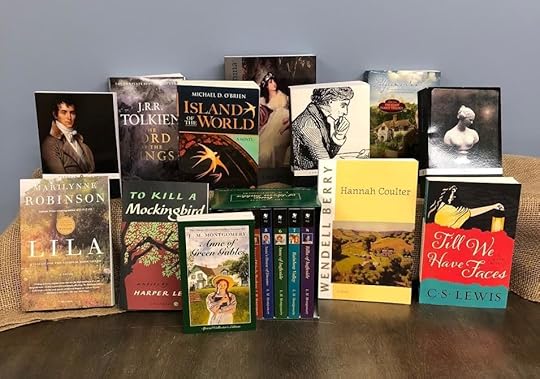
2. Tyndale's Grand Prize Giveaway: 12 of My Favorite Novels
Oh friends, this is a marvelous prize. My publisher, Tyndale Momentum is giving away all 12 books from the first booklist in Book Girl: 'The Beloved Dozen: The Novels That Taught Me How to Live'. You can enter up to 6 times (!), and the contest will be open until next Monday.
CLICK HERE TO ENTER.
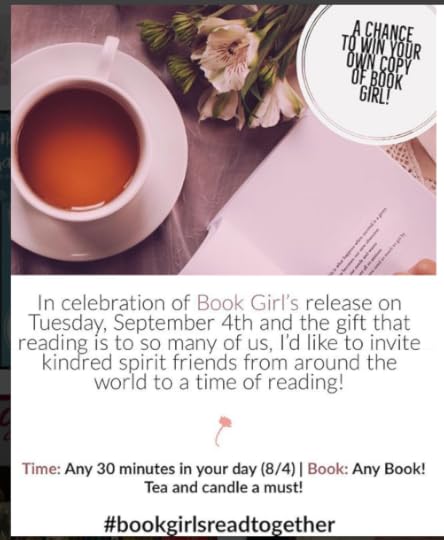
3. 'Book Girls Read Together' Launch Day Read-Along and Artwork Giveaway
I'm really excited about this and would love for you all to join me. The post (HERE) from yesterday outlines it in detail, but here's the recap: I'm inviting you to join me today (launch day, September 4th) in setting aside 30 minutes for reading (with hot cuppa of course). Then, take a picture of your reading moment, and post it to Instagram with the hashtag #bookgirlsreadtogether. Your post will be your entry to win a print of Breezy Brookshire's new Book Girl inspired piece of art OR your own copy of Book Girl. Plus, we shall together create a gallery of reading moments with kindred spirits around the world. How can you resist?
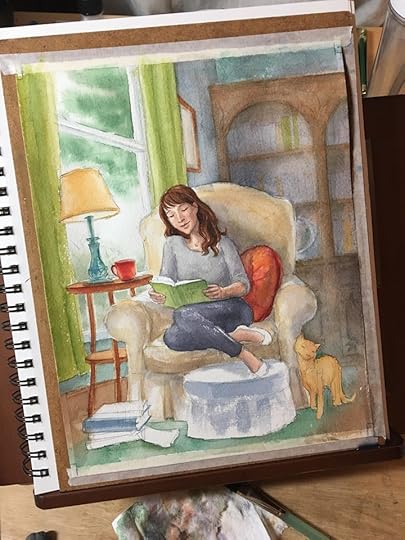
4. Book Girl Painting Giveaway
I'm darn excited about this one too (heck, let us be honest, I'm just delighted with it all today). In honor of Book Girl's launch I've commissioned a piece of artwork by Breezy Brookshire, who has charmingly captured the quintessential Book Girlish moment. To enter this contest, you need to sign up for my email list either here at the blog or through the link in my bio on Instagram, PLUS, either tag a friend on Instagram or share this post to your preferred social media platform.
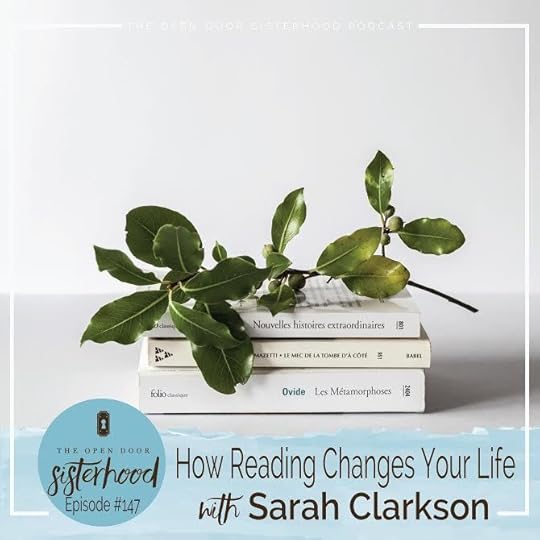
5. Podcasts galore!
Today, I am delighted to be a guest over at the Open Door Sisterhood Podcast. Oh friends, I so enjoyed this interview and was deeply encouraged by our talk. Head on over and join the conversation at the Open Door Sisterhood.
:: LISTEN HERE: Hey Sister! How Reading Changes Your Life with Sarah Clarkson
Also, my mom and I have done a series of podcasts on Book Girl and the joys of reading. If you haven't caught up on the most recent ones (I talk about how Tolkien saved my faith) or want to start from the beginning, take a look:
:: LISTEN HERE: How Tolkien Saved Sarah's Faith
:: LISTEN HERE: Book Girl: Shaping Your Life Story, Imagination, and Choices with Sarah
:: LISTEN HERE: Becoming A Book Girl, with Sarah and Sally
Finally friends, follow me on Instagram (@sarahwanders) as I'll be posting updates, maybe even an extra giveaway or two, and fun stories and quotes throughout the day. Oh, and the Book Girl playlist is below, just for your fun. Thank you so much for your encouragement, support, and just the delight of sharing this celebration with you. I hope to see you tonight at the live event and I hope your day is full of loveliness... and of course, some great books!
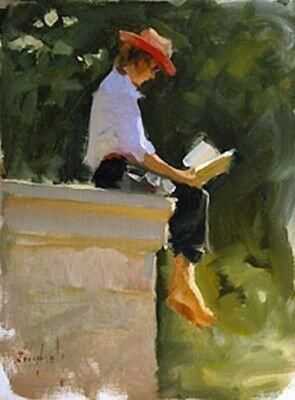
September 3, 2018
Book Girl's Launch Day Eve: A Playlist for Reading, an Invitation, and a Marvelous Giveaway
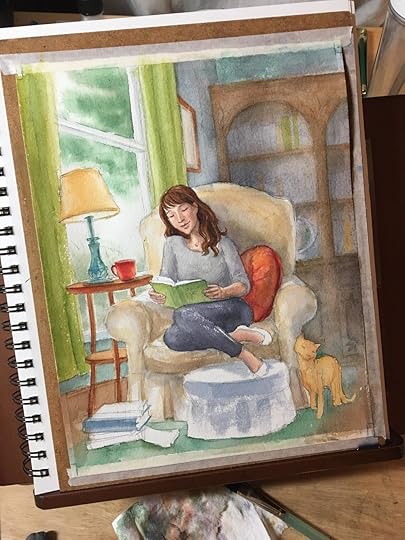
A work in progress by the lovely Breezy Brookshire.
As a little girl, I loved Christmas Eve just about as much as Christmas Day. Christmas Eve was a sacred, irreplaceable space of time when everything tingled with expectation, with the promise of celebration and gift. The preparation, the joy in crafting and cooking, wrapping and bustling was an integral part of the joy of the actual day when all the gifts would be unwrapped and the feasts devoured.
I feel the same about today; Book Girl releases tomorrow but I am taking so much joy in the preparation today, in planning for the fun tomorrow, in sharing your joy and expectation (thank you all of you who have written with such encouragement, such generous and shared excitement). In that spirit then, let me share several things with you here and invite you to one of the Launch Day projects that downright delights me.
First, please find a playlist (below) of my most beloved melodies for an afternoon hour of reading. These songs have accompanied my quiet, bookish moments for years. Perhaps they will bring a dose of extra delight to your reading as well.

Second, I'll be hosting a live, launch day event from my own little Oxford living room in celebration of Book Girl's release. My mom and I will be talking books and sharing our joy in the reading life. I'll read aloud from Book Girl, share a few of my current favorite reads, answer some of the questions you've sent my way via Instagram, and do a live giveaway of Book Girl and of the painting above. It will be an evening moment of candlelight and bookshelves and read-aloud from Oxford. 9pm British time (4pm EST, 3pmCST, 2pmMT, 1pmPT).
Third, I commissioned a little painting for the launch of Book Girl and I am so excited! Breezy Brookshire (click her name for a glimpse of her charming work) has created an image of a quintessentially book girlish moment, two prints of which I'll be giving away tomorrow. One of which will go to one of the kindred spirits who takes part in the launch day project I am so excited about; friends, this is your official invitation to:
Book Girls Read Together: A Launch Day Read-Along Who : Calling all kindred spirit book girls! (And guys, of course, if you want to join.) When : Any 30 minutes on the Book Girl Launch Day. (Tomorrow, Tuesday, September 4th) What : Join book girls around the world in setting aside half an hour to read (an accompanying cuppa with a candle is highly recommended) and document your book girl moment with a photo. Then, share that photo on Instagram with the hashtag #bookgirlsreadtogether Result : A worldwide party of reading, a gallery of bookish delight, AND you will be entered to win a copy of Breezy Brookshire's beautiful new painting of a Book Girl.And check back here tomorrow as I will be posting a guide to our literary launch day festivities with links to Tyndale's amazing giveaway, info on the Facebook and Instagram live event, and other giveaways and fun. Thanks so much for your generous encouragement along the way. Have a day of beauty and grace and... I'll see you tomorrow.



